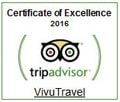This private tour in Cambodia gives you a chance to visit the most attraction of the capital - Phnom Penh, and to explore the Sovann Phum office for a taste of traditional Khmer culture. You will discover the 11th century Ek Phnom Temple before heading to Phnom Sampeau.
Highlights of this tour
• Visits to the National Museum, the Royal Palace and the Silver Pagoda
• Visit the genocide museum Toul Sleng and the Killing Fields
• Explore the Sovann Phum office for a taste of traditional Khmer culture
• Go to Kompong Chhnang
• Discover the 11th century Ek Phnom Temple
• Visit to Phnom Banan, head to Phnom Sampeau
Classic Cmabodia tour packages in brief:
Day 1: Phnom Penh Arrival
Day 2: Phnom Penh
Day 3: Phnom Penh - Battambang
Day 4: Battambang - Phnom Sampeau
Day 5: Battambang - Siem Reap - Angkor Thom
Day 6: Ta Prohm - Angkor Wat - Banteay Srei
Day 7: Tonle Sap Lake
Day 8: Siem Reap - Phnom Penh - Kep
Day 9: Kep
Day 10: Kep - Phnom Penh - Departure

You will be greeted at the airport and transferred to your hotel. In the afternoon, enjoy a city tour in a cyclo with visits to the National Museum, the Royal Palace and the Silver Pagoda. The National Museum of Cambodia was erected between 1917 and 1924. The National Museum of Cambodia houses one of the world's greatest collections of Khmer cultural material including sculpture, ceramics and ethnographic objects from the prehistoric, pre-Angkorian, Angkorian and post-Angkorian periods. Opposite to the National Museum is the Royal Palace with the Silver Pagoda inside. The Royal Palace was constructed over a century ago to serve as the residence of the Kings. The Royal Palace complex and attached 'Silver Pagoda' compound consist of several buildings, structures and gardens all located within 500x800 meter walled grounds overlooking a riverfront park. The high sculpted wall and golden spired Chanchhaya Pavilion stand distinctively against the riverfront skyline. Inside the Palace grounds, street sounds are silenced by the high walls and the various Royal buildings sit like ornate islands rising from the tranquil, manicured tropical gardens. Except for the area of the actual Royal residence, the Khemarin Palace, most of the Palace grounds and Silver Pagoda are open to the public. Welcome dinner in a famous local restaurant.
Overnight in Phnom Penh.
Accommodation at:

This morning, you will visit the genocide museum known as Toul Sleng and the Killing Fields.The Toul Sleng museum and the Killing Field are the most obvious evidences of the brutality of the Khmer Rouge Regime. Turning itself into a hell from a high school (the Chao Ponhea Yat High School), the Toul Sleng used to be a prison named S-21, a place of torturing and killing. And beside the museum is the Killing Field, with thousands of corpses of innocent prisons, a real evidence of the darkest period in the Cambodia history. After coming back to the past and feel the atmosphere of a prison camp, we will return to the present and visit the Sovann Phum office for a taste of traditional Khmer culture. Sovann Phum (meaning Golden Era) is an independent and self-financed Khmer association working at the forefront of performing arts in Cambodia. First established in 1994, Sovann Phum offer real opportunities for Cambodian artists to make a living through their art by organizing performances, as well as nurturing, preserving and promoting the treasures of Cambodian culture through various projects.
Overnight in Phnom Penh.
Accommodation at:
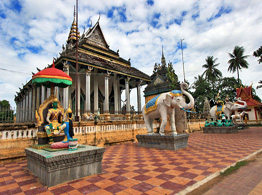
Depart the capital for the drive to Battambang. Along the way, you will stop at Udong, which is located 40 kilometres northwest of Phnom Penh. Cambodia's Royal Capital from the early 17th to 19th centuries, it was abandoned 1866 when King Norodom moved his court to the current capital, Phnom Penh. Continue on to Kompong Chhnang, where you will make a stop to view some of the ceramic workshops that the city if famous for. Later in the afternoon you will arrive in the city of Battambang. Founded in the 11th century by the Khmer Empire, Battambang is well known for being the leading rice-producing province of the country. For over 500 years, it was the main commercial hub of Siam's Eastern Provinces, though it was always populated by Khmer with a mix of ethnic Vietnamese, Lao, Thai and Chinese. Still today Battambang is the main hub of the Northwest connecting the entire region with Phnom Penh and Thailand, and as such it's a vital link to Cambodia.
Overnight in Battambang.
Accommodation at:

This morning discover the 11th century Ek Phnom Temple. Inside, you will be able to view some beautiful carvings which are still in remarkably good condition. After lunch, make a visit to Phnom Banan to enjoy the spectacular views of the surrounding countryside. Then head to Phnom Sampeau, a natural rocky hill offering a series of caves to explore. Sadly many of them were used as "killing caves" during the Khmer Rouge period.
Overnight in Battambang.
Accommodation at:

Today, you will travel to Siem Reap where you will begin your exploration of the magnificent temples of Angkor. In the afternoon, ride in the Buffalo Tours Tuk Tuk to visit the city of Angkor Thom. Start at the South Gate and walk along the ancient city wall to see the lost temple of Prasat Chroung. Continue to the Bayon temple, where you will be surrounded by the smiling faces of tens of Buddhas. Also make visits to the Terrace of the Elephants, the Royal Palace and the Terrace of the Leper King. Dinner in local restaurant.
Overnight in Siem Reap.
Accommodation at:

Rise early and travel in the Tuk Tuk to visit the jungle enveloped temple of Ta Prohm. Next, you will go to the spectacular Angkor Wat. Enjoy a guided tour around this awesome structure and learn about the glories of the Kingdom of Angkor. Return to the hotel for a late breakfast and a rest. In the afternoon, head to the temple of Banteay Srei or 'Citadel of the Women'. On your way back to Siem Reap, enjoy the sunset from the top of the pyramid-shaped temple of Pre Rup.
Overnight in Siem Reap.
Accommodation at:

This morning drive in the Buffalo Tours Tuk Tuk to the edge of Siem Reap. Enjoy a fun ox cart ride through the countryside, then continue by vehicle until you reach the Cambodia's largest freshwater lake; the Tonle Sap. Board a boat and spend the rest of the morning at one of the largest villages on the lake which is called Kompong Phluk. In the village you will witness the fascinating daily lives of the local people who live on the water. The boat service is provided by local people, and the profit goes directly back to the community. The rest of the day is at leisure.
Overnight in Siem Reap.
Accommodation at:

This morning depart Siem Reap and fly to Phnom Penh. On arrival, you will be driven to the coast and the charming resort of Kep. Once you have checked in, the rest of the day is free at leisure.
Overnight in Kep.
Accommodation at:

Today is free at leisure for you to explore this pretty resort. You may wish to wander around the town to view some of the French colonial architecture or even take a trip out to Rabbit Island to enjoy the beautiful beaches that the island is famous for.
Overnight in Kep.
Accommodation at:

Spend the morning at leisure until you are transferred to the airport in Phnom Penh for your onward flight. Indochinavalue thanks you so much for traveling with us. We hope you had a beautiful Cambodia holiday. All the best, goodbye and see you again!
END OF SERVICE
Accommodation at:
Tour guide
Tour guides who wor with usk are well-paid, experienced with a university background, eager to exchange our cultures and lifestyles ... with travelers, and have a great passion for their country and understand the personal touch. In some parts such as Sapa, we may use local tour guides who come from the ethnic hilltribes like H'Mong or Red Dao as they know about their land much better than anyone else and this is also the way that Indochinavalue helps the local people a better life.

Tour guide is one of the most inportant factors to a successful holiday. Indochinavalue understands that a good tour guide needs not only good knowledge on history, culture, good English, French... but also needs to have general requirements and follow our guidelines as below:
1 - Licensed at least for 4 years with work experience.
2 - Guiding does require more than just hanging out in the sun. Guides must be friendly and good with people, organized enough to keep groups or people on schedule, quick on their feet and ready for the inevitable snafus that arises.
3 - Must be an honest broker of their services and able to take criticism.
4 - Should be qualified at some level in health, health care or first aid.
5 - Able to relate to people from a wide range of cultures and backgrounds.
6 - Clear speech and good hearing.
7 - Must not be a alcoholic or No-alcohol during working time or anytime when on tour.
8 - Tour guide is a nurse to take care of visitors, a boss to keep the right itinerary, a teacher to give information, an ambassador to introduce our country, an entertainer because Indochinavalue's clients want to be entertained in extend, a friend...
9 - Must be on time every time. Being late or delay is unacceptable.
10 - Check flight tickets, train tickets, meals, weather... to make sure things are in order and inform local office if any changes that might effect the tour.
11 - Solve problems with care when there is dissatisfy. Argument should be averted by courtesy.
Transport
Kind of vehicle (offered on tour) depends on the size of your group size or your requirements.To ensure your comfort, all cars feature air conditioning and enough room inside. Drivers are local, with years of experience, taking you to your destination quickly and safely.
1 - Our drivers are professional and reliable with at least 5 years of experience, driving safely.
2 - Our drivers are not allowed to hear cell-phone or smoke, chat, drink when driving.
3 - Our drivers must be friendly, helpful with good behavior and attitude.
4 - Our drivers are not allowed to take you to shops unless you ask for.
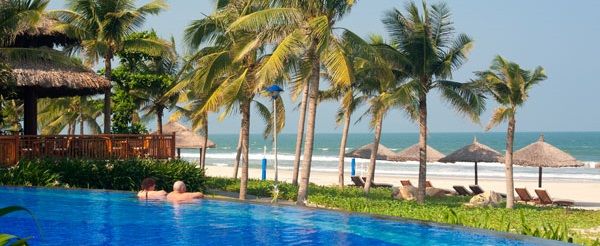
2 Stars from: US$35 -> US$40
The 2 star hotels are good for budget travelers and sometimes, we have no choice but stay in a guesthouse, mini hotel, 2 star hotel in the remote and mountainous areas. Basically, 2 star hotels will offer good size and clean guest rooms with AC, TV, hot water, shower and private bathrooms
3 Stars from: US$40 -> US$80
The 3 star hotels are good for many travelers because they offer basic needs for a comfortable stay, good size and clean guest rooms with Free access high speed Internet, Welcome baskets and drinking water, Telephone with international dialing, Electronic safe box in room, Hairdryer, Coffee and Tea, Wake-up service, AC, TV, hot water, shower and private bathrooms. On-site restaurants with breakfast included and lunch or dinner at your own pick up. A small fitness center, spa and swimming pool can be expected.
4 Stars from: US$80 -> US$130
Offering a wide range of comfortable boutique hotels are available with shopping, dining andentertainment facilities nearby. Featuring quality service, fully furnished rooms, restaurants, fitness center with spa (and swimming pool in most cases), the hotels are expected to offer an above-average accommodation experience.
5 Stars from: US$130 -> US$200 –> US$ 300
Offering an extensive range of facilities for an excellent experience. Multiple restaurants on siteand a wide range of choice for buffet breakfast, good size of swimming pool, fitness center and concierge service round out the experience.
The restaurants we will take you for lunch or dinner are all designated tourist restaurants approved by local tourist administration bureau. They have very good sanitary conditions and the food is prepared fresh and clean.
Note: If you have any special dietary needs, just let your travel consultant know when booking.
Breakfast:
Breakfast is included at all hotels and is buffet breakfast with Asian and Western food.
Lunch:
Lunches (if included) are usually set menu at handpicked local restaurant with comfortable dining environment where you can rest assure to taste the local flavor. All restaurants are carefully selected and highly recommended.
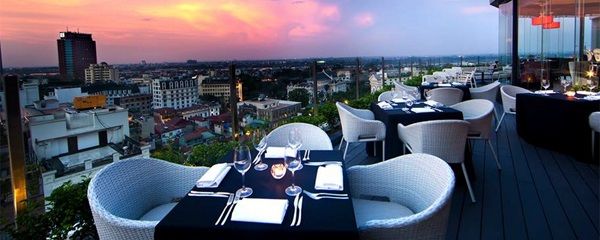
Dinner:
Dinners are only included if you stay overnight in a homestay with a local family, on cruise inHalong Bay, Mekong Delta or at some special occasions such as welcome dinner, farewell dinner or on requested. So dinners are at your own choice and arrangement, but our tour guides will always give you good suggestions based on your preferences.
If allergic to some food
We suggest you to list any food or ingredients that you are allergic to and let our travel consultant know. Then your travel consultant will mark them in the guide’s itinerary, so that our guides in different cities can make some preparations and arrangements in advance.
Do our guide and driver join the meal with us?
The tour guides and driver will be at the same restaurants with you, but they will only join themeal when you invite. Sometimes the drivers are shy to join as they usually eat fast and could not understand English talk around the table, so the guide will be with you more often.
Street food tour:
Street foods in Vietnam are very delicious and should you want to taste the specialities of each Vietnam holiday destination, we can arrange a street food tour for you. Please contact us at info@indochinavalue.com for a detailed tour itinerary and quotation.
How to request a tour package?
To request for a free tour itinerary and quotation, you can just fill out the tour inquiry form at www.indochinavalue.com or send us an email at info@indochinavalue.com then give us as much information as possible. One of our experienced travel consultants will get back to you shortly. All changes will be made (free of charge) until the your tour package meets your needs and personal interests.
How to book a tour package?
As soon as you agree on our proposal, please send us your full name, international flightinformation (if you have) and your special requirements. We will make reservations and arrange everything then confirm back to you when all done.
Payment
- Deposit is a "must". We request 30% of the tour cost. You can pay by wire transfer, creditcards, western union, onepay (online)
- Balance can be made before your arrival or on arrival in cash or by credit cards.
Changes
Changes are possible at the last minutes. However, if changes caused extra costs, you willhave to pay for. (For examples, hotels, flights, cruises...)
Cancellation
In case of cancellation, we will not apply any charge if we are not charged by the third partiessuch as hotels, cruises, flights, trains...We will recalculate the costs and resend you the money as soon as possible.
Tipping
Thanks you Tipping is not mandatory but it is expected in Tipping is not mandatory but it is expected in many circumstances for service. You can tip your driver/tour guide more or less or nothing. All depends on the services you receive.
Tipping is not mandatory but it is expected in many circumstances for service. You can tip your driver/tour guide more or less or nothing. All depends on the services you receive.
Suggested tips:
- US$10 – US$ 15 per day for tour guide
- US$7 – US$ 10 per day for driver
- US$1 – US$ 3 per meal for waiter or waitress
- US$2 – US$ 5 for short boat trips/ cyclo/ tuktuk (1 – 2) hours
Note: Please check with your travel consultant before coming and your tour guide if you are to tip someone on tour.
What you get when booking a private tour with Indochinavalue?
1. Private guide, driver and vehicle are for your exclusive use; no matter you are individually,or in a family or friends group. The tour is run exclusively for you without strangers.
2. Every itinerary can be customized to meet your specific interests/ wishes, that is, you can choose your favored hotels, sightseeing spots, the tour length, means of transportation, budget, etc. All are free of charge.
3. Start the tour on any date you want.
4. Escort you from start to finish. All private transfers during the tour are offered, including airport/ train station transfer, hotel-attractions round trip transfer.
5. The sightseeing during the tour could be based on your own timetable and pace. Flexible to change at your short notice.
6. Considerate care and assistance, such as the old, the disabled or families with small kids and children.
7. You can save time and money when traveling with us or your wants meet you budget.
How do I get a visa?
Vietnam Visa On Arrival is available for help. It is legitimated and supported by the VietnameseImmigration Department. We recommend that you choose visa upon arrival, as picking up visa at the Vietnam int'l airport/ border is quite simple, easy, no additional charges and no fail.
Please provide the following information for us to apply for your visa:
2) Passport number
3) Date of birth
4) Nationality
5) Date of arrival
6) Date of issue
7) Date of expire
8) Please make sure that your passport is still valid for 6 months.
Can I use credit cards in Vietnam?
Major credit cards such as Master Card, Visa, Diner's Card, American Express and JCB can beused to purchase goods in large shopping malls and stores in the big and medium cities, to pay for hotel rooms and for meals in some of the fancier restaurants, and to buy plane tickets with them.
Note:
- You can use US dollar, Euro in all big cities or at major tourist sites, airports.
- If you are to travel to those small cities or even remote rural areas, only cash in Dong can be used.
Do I need to bring my medical record with me?
Yes, we suggest you take your medical record with you in case that you need it in the event ofan emergency, and please also take with you your doctor's name, address and phone number, emergency contact name and phone number, and your insurance company's name, address and phone number.
Note: You can buy medicines everywhere in Vietnam so do not need to bring medicines from home.
When I finish my tour in Vietnam, if I still have some local money, what can I do?
Upon leaving Vietnam, if you still have some local money, you can change them back to foreign currency with your passport and the exchange memos given by the banks or money exchange counters. So please keep those exchange memos well whenever you change money.
What should we bring along on our trip to Vietnam?
It is best to travel light in Vietnam. Onemedium sized bag and a day pack will provide more than enough room to carry everything you'll need, and enough space for the things you'll buy in Vietnam.
There are lots of consumer goods in Hanoi and Ho Chi Minh City, so do not worry about running out of something. If you do forget something you can easily find it here. Before you leave home complete the following checklist:
- Lightweight and quick dry clothing is most appropriate for the summer months, and warmer clothing for the winter months. As well, sun hat, swim suit, ultra lightweight rain jacket.
- Travel Documents: Passport, Visa, Travel Insurance, Air Tickets (you should scan them and email them to yourself in case you loose them).
- Health requirements, medications, and travel insurance arranged.
- Flashlight, alarm clock, sunglasses, sunscreen, insect repellent, small personal first aid kit, personal toiletries.
- Money: US dollars or travelers cheques and/ or credit card(s).
- Raincoat or umbrella, good hiking shoes are needed for all Footprint trekking trips.
- Camera with charger, extra batteries, and memory cards.
Are there any restrictions on the type of luggage that we bring? Domestic airlines have their weight restrictions. On most domestic and low-cost airlines You may only have one suitcase or backpack, with a maximum weight of 20kg, and one piece of hand luggage, with a maximum weight of (5 – 7)kg. An extra charge for overweight is applied.
There is no actual limit on our trips, but we would suggest you travel light with one suitcase or backpack and one small daypack or small bag which you can access during the day and carry items like your camera, drinking water, toilet paper, hat, sunscreen, etc.
It is essential that you have a lock for each piece of luggage. Without one, railway and airline staff and some hotels may refuse to handle it.
What is the best type of clothing we should bring?
Here is a short checklist of best type of clothing you should bring:
- Shorts and comfortable pants;
- Shirts, t-shirts and maybe some long sleeves shirts (for regions with mosquitos like the Mekong delta);
- Swim suits (for the beaches and Halong Bay);
- Good sandles as well as good shoes if trekking.
Nevertheless, it will really depend on where you travel to, when you plan on travelling, and what you plan on doing. Please note that the weather can be very cold during the winter in the Northern Vietnam (Nov to Mar) and quite cool in the central highlands (Dalat). You will need to bring a good jacket along for this time of the year, the avarage temperature is about 15 oC, but can get as cold as 3 oC.
Tip: Do not worry if you do not pack enough clothes or forget something because you can buy in Vietnam.
Shopping in Vietnam
Shopping in VietnamMany tourists can’t help but throw themselves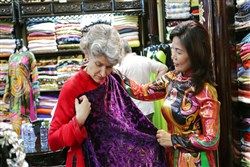 head-first into shopping while in Vietnam. Why? Probably the variety of quality goods and the tempting prices have a lot to do with it. Many low-budget travelers considered Vietnam a heavenly place because in many shopping situations they can bargain the prices down to as much as a third of the original cost.
head-first into shopping while in Vietnam. Why? Probably the variety of quality goods and the tempting prices have a lot to do with it. Many low-budget travelers considered Vietnam a heavenly place because in many shopping situations they can bargain the prices down to as much as a third of the original cost.
The list of Vietnamese bargains is seemingly endless and features bespoke tailoring and the national dress, the 'ao dai' from high-quality silk and many other types of material and textiles while many shoppers cannot get enough of the local handicraft, art and jewelry.
How to bargain?
Bargain is not common in some countries, but in Vietnam it really is. In Vietnam, bargaining isalways worthwhile. Yet, it is not always due to the fact that the local have a great deal of time and very little money. Bargaining is part of Vietnamese culture as through bargaining people communicate with others, create and build up their relationship, not to mention a form of entertainment.
Rule - 1: It's like the monster ride at the amusement park. If you're not having fun, get off.
Rule - 2: Don't bargain with the first person who approaches you (i.e., when looking for a taxi at the airport.) In general the further you go from the center of action, the cheaper the price.
Rule - 3: Don't be afraid to use walking away as a bargaining tool. You can always come back.
Rule - 4: Don't let pride get in the way of coming back (or Rule #3 is useless).
Rule - 5: If you really want something and the price isn't coming down, give in gracefully. (It's that pride thing again.)
Rule - 6: Don't always assume you're getting ripped off just because you're in a third-world country. Sometimes the price they're asking is the real one.
Rule - 7: Bargaining is a time/ money tradeoff. If you're in a hurry, be prepared to pay for it.
Rule - 8: Ask (Vietnamese) fellow shoppers the price of an item before you begin bargaining.
Rule - 9: Always carry small bills. Otherwise all that work is likely to be for nothing.
Rule - 10: Always bargain in native currency. Conventional wisdom says anyone who has dollars can afford to spend them.
Rule - 11: If possible, keep going back to the same person until you've gotten to know him/ her. Most third world countries have a name for this kind of relationship. The deal is that you offer your business on a regular basis and the seller responds by saving you their best tomatoes
Rule - 12: No matter what your parents told you, when you're bargaining it's perfectly okay to lie





